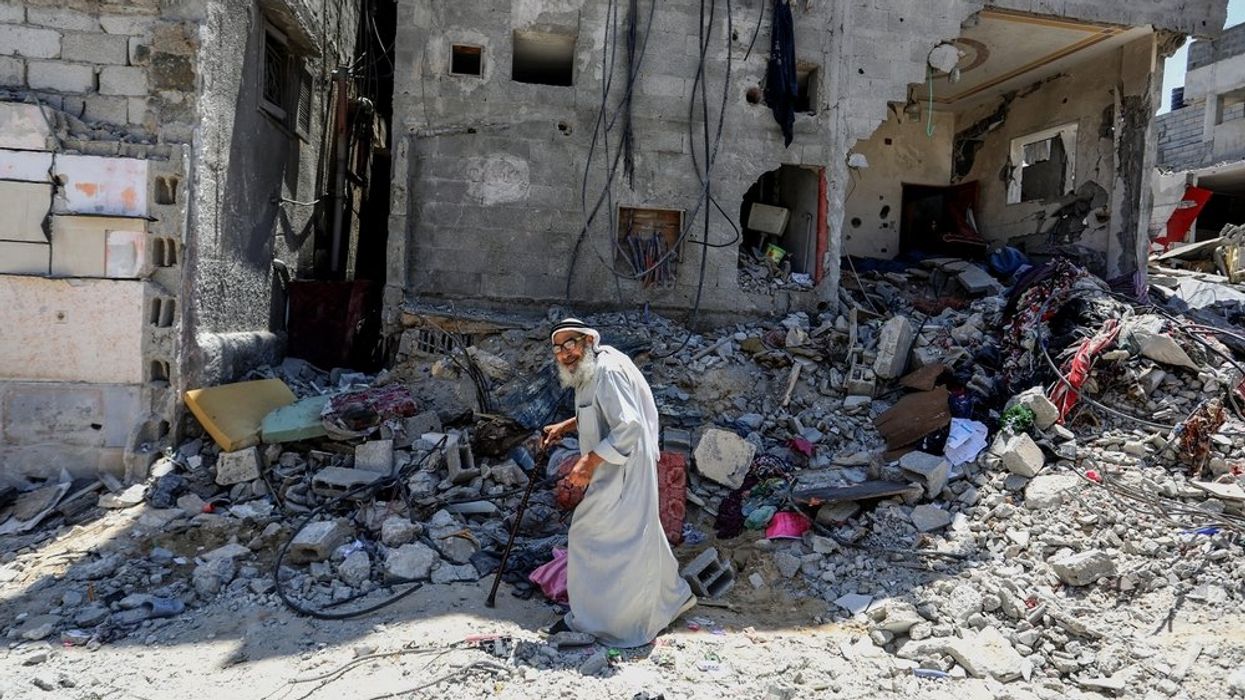
Video Source: Advocate Channel
Gaza and Jerusalem (CNN) — Israel has widened its offensive against Hamas and its regional enemies, intensifying its bombardment of the besieged Gaza Strip, striking Hezbollah cells in Lebanon and targeting the occupied West Bank.
Hundreds were killed in Gaza after sustained aerial assaults on Monday morning, according to the health ministry in the enclave, which is controlled by Hamas. And while two convoys of aid trucks crossed into Gaza from Egypt over the weekend, relief agencies warned that the needs of the 2 million people in the enclave are vast.
The ministry said 436 people, including 182 children, were killed in strikes overnight. Most of those killed were from the southern part of Gaza, the ministry added.
Israeli airstrikes have killed at least 5,087 people in Gaza since October 7, including 1,119 women and 2,055 children, according to the health ministry. At least 14,245 people were wounded, it added.
Overnight strikes on Sunday appeared to be some ofthe most sustained bombardments of northern Gaza in the past two weeks, according to a CNN team on the ground in southern Israel, and came as the Israel Defense Forces (IDF) prepares for a potential large ground operation, with huge numbers of troops and tanks massed at the border.
At least 26 people were killed in Israeli strikes on the Jabalia refugee camp – one of the largest in Gaza – the director of the Indonesian Hospital in Gaza, Atef Al Kahlout told CNN. In the southern city of Rafah, 29 people were killed after four houses were struck, according to the Ministry of Health in Gaza spokesperson Ashraf Al Qidra.
Large plumes of smoke were seen rising from the Gaza skyline after Israeli airstrikes on the strip, a live feed on Al-Jazeera said. Reuters showed a large smoke cloud rising from Gaza and seen from southern Israel.
The bombs hit buildings in Rafah, Khan Younis, central Gaza and Gaza City, including homes, the Palestinian Interior Ministry in Gaza said. The IDF said on Monday that it struck 320 “terror targets” in Gaza overnight, including tunnels and “dozens of operational command centers” belonging to Hamas and Islamic Jihad.
The Israeli siege and near-constant bombing of Gaza in response to the October 7 murder and kidnap rampage by Hamas has leveled entire neighborhoods, including schools and mosques, and devastated the already insufficient health care system.
Aid trickles into the enclave
A total of 34 trucks filled with desperately needed aid traveled into Gaza from Egypt over the weekend. But none of those vehicles were carrying fuel supplies, which is vital for running hospitals and treating water in the isolated territory. Israel has said that fuel would be purloined by Hamas.
Aid workers and international leaders warned that the supplies were insufficient to combat the “catastrophic” humanitarian situation in Gaza, while the Palestine Red Crescent Society said it is a “drop in the ocean” of what is needed.
The territory normally receives 455 aid trucks per day, according to the United Nations. That means that with the weekend deliveries, Gaza is more than 7,200 truckloads of aid short of what would normally have been received between October 7 and October 22, CNN calculations suggest. That’s half of 1 percent – or one two-hundredth – of the amount of aid it ordinarily gets.
As the situation in the strip gets increasingly dire, doctors in Gaza hospitals are being forced to operate without morphine or painkillers due to shortages, according to Leo Cans from Doctors Without Borders.
“We currently have people being operated on without having morphine. It just happened to two kids,” said the head of mission in Jerusalem for the group also known as Médecins Sans Frontières.
“We have a lot of kids that are unfortunately among the wounded, and I was discussing with one of our surgeons, who received a 10-year-old yesterday, burnt on 60% of the body surface, and he didn’t end up having painkillers,” Cans continued.
“There is no justification at all to block these essential medicines to reach the population.”
Cans also acknowledged CNN’s reporting on parents who have resorted to writing their childrens’ names on their limbs in the event that either they or the children are killed.
Medical professionals have also described “catastrophic” conditions at one central Gazan hospital as electricity and fuel supplies run out and crippled medical facilities rapidly become overwhelmed with casualties.
Dr. Iyad Issa Abu Zaher, director general of Al-Aqsa Martyrs Hospital in Gaza, described a “bloody day” for his staff to CNN on Sunday, saying the hospital had received up to 166 bodies and more than 300 injured people.
“It’s impossible for any hospital in the world to admit this number of injured,” he said.
Videos obtained by CNN showed the hospital receiving more than a dozen bodies wrapped in shrouds, while grieving family members tried to identify them.
At another Gaza hospital, doctors have warned that most of the critically ill infants relying on ventilators in the neonatal unit will die if the electricity supply is interrupted.
“If the electricity is stopped, there will be catastrophic events inside this unit,” said Dr. Fu’ad al-Bulbul, head of the neonatal department Unit at Al-Shifa hospital in Gaza, in a video released by the Health Ministry in Gaza.
“We can save only one [or] two babies but, we cannot save all babies.”
Gaza residents: Nowhere is safe
Over the weekend, Israel called once again for civilians to leave northern parts of the strip – a warning that was condemned by the World Health Organization and which the Palestinian Red Crescent said amounted to a “death penalty for patients.”
Residents who chose to remain behind told CNN that no place was safe in the Gaza Strip amid Israel’s heavy bombardment.
“They want us all dead, they are whipping Gaza, this has nothing to do with a war against Hamas,” one resident of Jabalia, Mahmoud, said.
“My mother is paralyzed, she refuses to evacuate and says there is no safe place,” he said.
Another resident of Jabalia, Mohammad Salama, said he lost 18 family members in a strike on Monday morning, mostly women and children.
“There are no terrorists here, I swear on all my family members that I lost today, it’s only innocent civilians,” Salama said.
Mahdiya Issa from the Al Zahra in the central Gaza Strip told CNN that they have been continuously displaced, moving from one house to another.
“There are 50 displaced people in every house. The children are frightened - there is no food, drink or water,” Issa said, standing near a destroyed building in the neighborhood.
IDF chief of staff Herzi Halevi told commanders Saturday that the Israelimilitary is preparing to “enter the Gaza Strip” and “destroy Hamas operatives and infrastructures,” but offered no timeline for the possible ground offensive.
On Sunday, Hamas and Israeli forces engaged in limited clashes inside Gaza – in what is believed to be one of the first significant skirmishes on the ground inside the strip since the Islamist militants’ October 7 attack on Israel that killed more than 1,400 people,mostly civilians.
An IDF soldier was killed and three others were wounded during an operation in the area of Kibbutz Kissufim near Gaza on Sunday, according to IDF spokesperson Daniel Hagari. Earlier, Hamas said its fighters had destroyed two Israeli military bulldozers and a tank in an ambush near the Gazan city of Khan Younis, forcing Israeli troops to retreat without their vehicles.
‘No ceasefire’
The United States and its allies have urged Israel to be strategic and clear about its goals during any ground operation in Gaza, warning against a prolonged occupation and placing a particular emphasis on avoiding civilian casualties, although the past two weeks has already seen more people killed in Gaza than during any previous conflict with Israel.
The mounting death toll has sparked growing protests across the Middle East and further afield as social media fills with imagery of the devastation Gazans are living through.
On Sunday, US President Joe Biden made a flurry of calls to world leaders, including Israeli Prime Minister Benjamin Netanyahu, about the ongoing conflict and amid efforts by US officials seeking to keep it from widening.
The White House said Netanyahu and Biden “affirmed there will now be a continued flow” of humanitarian assistance to Gaza during their call.
CNN previously reported that the Biden administration has pressed Israel to delay its imminent invasion of Gaza to allow for the release of more Hamas hostages and aid into the enclave. IDF spokesman Hagari said the Israeli military now believed 222 people were kidnapped during Hamas’ October 7 attack.
Despite US and Qatari efforts to free the hostages held by Hamas, a senior Israeli official told CNN Sunday there will be “no ceasefire” in Gaza.
The official said they were “not aware” of US calls for a delay to the Gaza ground operation. The official added that both Israel and the US want all the hostages released “as quickly as possible” but said “humanitarian efforts cannot be allowed to impact the mission to dismantle Hamas.”
Wider conflict
As Israel readies its troops around Gaza, its military has also been engaged in flare-ups elsewhere, with increasing violence in the occupied West Bank and on its northern border with Lebanon.
Late Sunday and into Monday, the IDF said it struckcells belonging to the Lebanon-based Hezbollah, an Iran-backed paramilitary movement, on the Lebanese side of the border, which it said had planned to launch attacks on Israel.
Netanyahu warned Sunday that if Hezbollah decides to enter the war, it will be crippled “with a force [it] cannot even imagine.”
The occupied West Bank has seen Israeli raids and the arrest of dozens of alleged Hamas members.
On Sunday, the IDF launched an airstrike on the Al-Ansar mosque in the West Bank refugee camp of Jenin, which it said was being used by militant groups to plan for “an imminent terror attack.”
It would not say whether the strike came from a jet, in what would be the first fighter jet strike in the West Bank in nearly two decades.
The-CNN-Wire
™ & © 2023 Cable News Network, Inc., a Warner Bros. Discovery Company. All rights reserved.
- Israel Orders 1.1 Million Gazans to Evacuate, UN Warns of 'Devastating Humanitarian Consequences' ›
- UN Sounds Alarm on 'Risk of Genocide' Against Palestinians ›
- Palestinians Lament Israeli Airstrikes Endangering Civilians in Gaza: 'We're Not Hamas' ›
- Queering the Map in Gaza: LGBTQ+ Palestinians Pay Tribute to Deceased Loved Ones ›


















































